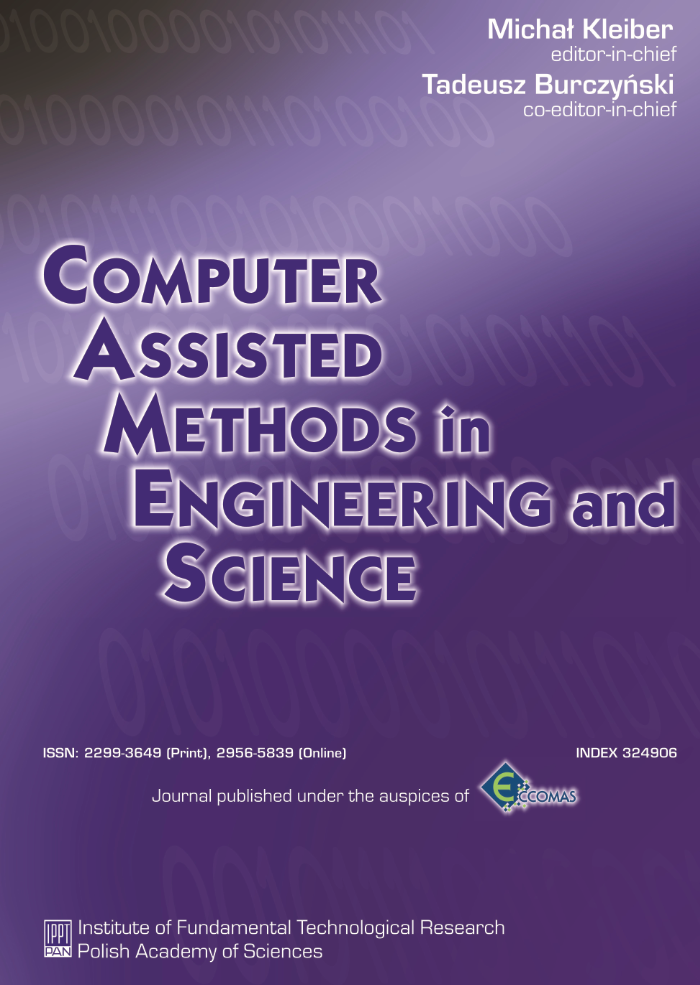Abstract
Various methods are available to compute kinematics and dynamics in the case of spatial mechanisms. These methods are cumbersome and laborious for large and multibody spatial mechanisms. The bond graph technique is a powerful alternative tool for modeling. A four-link closed-chain 3R2S (3Revolute 2Spherical) spatial mechanism stands out among the other four-link closed-chain spatial mechanisms due to its ability to be used in a number of applications. The main aim of this paper is to compute the inverse kinematics of the mechanism using the bond graph structure of the system. In this paper, modeling of a four-link closed-chain 3R2S spatial mechanism has been conducted using a multibond graph approach. Inverse kinematics of the spatial mechanism, under various applications, has been directly obtained from the bond graph modeling. MATLAB coding for simulation has been done directly from the multibond graph without explicitly deriving system equations. The simulation results have been analyzed and discussed using various plots.
Keywords:
bond graph, spatial mechanism, kinematics, modeling, simulationReferences
2. A. Ghosh, A.K. Mallik, Theory of mechanisms and machines, East-West Press (P) Ltd., New Delhi, 2006.
3. J.J. Craig, Solutions Manual. Introduction to robotics: mechanics and control, Pearson Education Inc., 2005.
4. K.J.Waldron, G.L. Kinzel, Kinematics, dynamics and design of machinery, 2nd ed., Wiley & Sons, 2004.
5. J.J. Dicker Jr., G.R. Pennock, J.E. Shigley, Theory of machine and mechanisms, 3rd ed., Oxford University Press, New Delhi, 2009.
6. H. Goldstein, Classical mechanics, Narosa Publishing House, 1995.
7. F.T. Brown, Bond graphs for nonholonomic dynamic systems, Journal of Dynamic Systems, Measurement, and Control, 98(4): 361–366, 1976, https://doi.org/10.1115/1.3427052.
8. M.J.L. Tiernego, A.M. Bos, Modelling the dynamics and kinematics of mechanical systems with multibond graphs, Journal of the Franklin Institute, 319(1–2): 37–50, 1985, doi: 0.1016/0016-0032(85)90063-8.
9. E.P. Fahrenthold, J.D. Wargo, Vector and tensor based bond graph for physical systems modeling, Journal of the Franklin Institute, 328(5/6): 833–853, 1991.
10. D.C. Karnopp, Understanding multibody dynamics using bond graph representations, Journal of the Franklin Institute, 334(4): 631–642, 1997, https://doi.org/10.1016/S0016-0032(96)00083-X.
11. A. Mukherjee, R. Karmarkar, Modelling and simulation of engineering systems through bond graphs, Narosa Publishing House, New Delhi, 2000.
12. D.C. Karnopp, D.L. Margolis, R.C. Rosenberg, System dynamics: modeling and simulation of mechatronic systems, Wiley-InterScience, New York, 2000.
13. D.C. Karnopp, Power-conserving transformations: physical interpretations and applications using bond graphs, Journal of the Franklin Institute, 288(3): 175–201, 1969, https://doi.org/10.1016/0016-0032(69)00246-8.
14. A.M. Bos, M.J.L. Tiernego, Formula manipulation in the bond graph modelling and simulation of large mechanical systems, Journal of The Franklin Institute, 319(1–2): 51–65, 1985, https://doi.org/10.1016/0016-0032(85)90064-X.
15. A. Zeid, C.-H. Chung, Bond graph modeling of multibody, systems: a library, of threedimensional joints, Journal of The Franklin Institute, 319(4): 605–636, 1992, https://doi.org/10.1016/0016-0032(92)90076-S.
16. J. Jang, C. Han, Proposition of a modeling method for constrained mechanical systems based on the vector bond graph, Journal of the Franklin Institute, 335(3): 451–469, 1998, https://doi.org/10.1016/S0016-0032(96)00129-9.
17. G. Dauphin-Tanguy, A. Rahmani, C. Sueur, Bond graph aided design of controlled systems, Simulation Practice and Theory, 7(5): 493–513, 1999, https://doi.org/10.1016/S0928-4869(99)00009-9.
18. A. Vaz, S. Hirai, Modeling a hand prosthesis with word bond graph objects, Systems, Man and Cybernetics, 5: 4508–4513, 2003, https://doi.org/10.1109/ICSMC.2003.1245694.
19. A. Vaz, P. Sharma, R. Atri, Modeling and simulation of the dynamics of crankshaft connecting rod-piston-cylinder mechanism and a universal joint using the bond graph approach, 14th National Conference on Machines and Mechanisms (NaCoMM09), NIT, Durgapur, India, Dec. 17–18, pp. 298–303, 2009, http://www.nacomm09.ammindia.org/NaCoMM-2009/nacomm09_final_pap/DVAM/DVAMAV3.pdf.
20. A. Vaz, G.K. Thommen, Modeling and simulation of the dynamics of the quick return mechanism: a bond graph approach, 10th National Conference on Industrial Problems on Machines and Mechanisms (IPRoMM 2010), MNIT, Jaipur, Dec. 17–18, (IPRoMM), pp. 23–30, 2010.
21. W. Favre-Marquis, S. Scavarda, Alternative causality assignment procedures in bond graph for mechanical systems, Journal of Dynamic Systems, Measurement, and Control, 124(3): 457–463, 2002, https://doi.org/10.1115/1.1481369.
22. F.T. Brown, Lagrangian bond graphs, Journal of Dynamic Systems, Measurement, and Control, 94(3): 213–221, 1972, https://doi.org/10.1115/1.3426591.
23. D. Karnopp, Lagrange’s equations for complex bond graph systems, Journal of Dynamic Systems, Measurement, and Control, 99(4): 300–306, 1977, https://doi.org/10.1115/1.3427123.
24. D. Karnopp, Alternative bond graph causal patterns and equation formulations for dynamic systems, Journal of Dynamic Systems, Measurement, and Control, 105(59): 58–63, 1983, https://doi.org/10.1115/1.3149645.
25. F.T. Brown, Hamiltonian and Lagrangian bond graphs, Journal of the Franklin Institute, 328(5–6): 809–831, 1991, https://doi.org/10.1016/0016-0032(91)90056-9.
26. A. Vaz, Bond graph modeling for rigid body dynamics, Lecture Notes, 2008.
27. N. Mishra, A. Vaz, Bond graph modeling of a 3-joint string-tube actuated finger prosthesis, Mechanism and Machine Theory, 117: 1–20, 2017, https://doi.org/10.1016/j.mechmachtheory.2017.06.018.
28. N. Mishra, A. Vaz, Modeling and simulation of dynamics of a three dimensional teeter toy using bond graph, Proceedings of the 1st International Conference on Artificial Intelligence, Modelling and Simulation, AIMS, Kota Kinabalu, Malaysia, Dec. 3–5, 2013, pp. 227–232, 2014, https://doi.org/10.1109/AIMS.2013.43.
29. MATLAB 7.9.0 The MathWorks, Inc., R2016a.






